Having the freedom to run your businesses your way means owning a fleet in the Landstar network can look different and achieve a variety of goals, depending on the business owner. Here’s a look at a few of the ways Landstar business capacity owners (BCOs), the company’s term for owner-operators leased to Landstar, have structured their fleets.
Fleets Can Be a Family Affair
When the housing bubble burst in 2008, Joe Mullen, who had been primarily hauling kitchen cabinets, knew he needed to find a different way to support his family. With backing from his wife, Elizabeth, he decided to buy a truck and start his own business. “You’ve got to have determination when starting a business – and not be afraid to lose money,” said Mullen. “I told my wife that we can risk it, but we might lose it all. She said go for it.”
The risk paid off. Joe Mullen became an independent owner-operator leased to Landstar, started his company Mullen Transportation, and now owns and operates a fleet of 15 trucks with six trailers and 12 drivers in the Landstar network. The decision to build a fleet came from Elizabeth’s request for Joe to stay at home with the family more, and the fleet allowed him to do that. While Joe handles the truck and trailer side of things, Elizabeth manages dispatch and business administration.
Driver retention is a big part of their business success. “We are always honest and upfront with our drivers so they know how much they are going to make and how they are going to be paid. We want our fleet drivers to know they are valued and appreciated,” said Mullen. “Because of this, we have a core group of drivers who have been with us for several years and we consider to be family.”
Mullen also says Landstar and the relationships he has developed within the company, are an invaluable tool for his business. “Landstar makes being a fleet owner easier – they stay on top of the important things that help keep my trucks and my business compliant, so I don’t have to worry.”
Mullen’s business continues to grow steadily in revenue, but he is near his maximum for the number of trucks he wants to own. “I don’t need a bunch of trucks,” he says. “All I want is enough for my family to be happy.”
Fleets Can Help Others Start Their Businesses
Not long after self-proclaimed “serial entrepreneur” Larry Long sold his business in 2007, he came across an advertisement while flipping through a classified ads magazine. The ad recruiting truck drivers inspired him. Eager to start a new project, Long went through CDL school, and began his career as an owner-operator and fleet owner.
Over the next five years, he grew his fleet to four trucks while leasing to another company but was ready to take the next step in growing his business. He decided to move each of his trucks to a different company, including a truck leased to Landstar with a qualified driver, to determine which one would be the most profitable. Less than a year later, it was clear that the Landstar-leased truck was outperforming the others. As a result, Long became qualified with Landstar and moved the rest of his fleet over to Landstar in 2013.
Fast forward to 2022, Long’s Blue Ribbon Logistical Solutions now operates a fleet of 15 trucks leased to Landstar and helps other entrepreneurs get their start in the trucking industry. “My fleet is different in that I’m not looking to hire long-term drivers. Instead, I work with people who want to become part of the Landstar network but don’t yet own a truck,” says Long.
Drivers are employed by Blue Ribbon Logistical Solutions for a year and a half, during which Long teaches them the Landstar system, how to be a successful business owner, and how to save for and purchase their own trucks. Long says, “The goal is goodbye – so after completing the program, drivers are ready to start their own business as an owner-operator leased to Landstar.”
Despite his love for helping others get a start in trucking, Long still has his own business to run and is always looking for ways to grow his fleet. His business model focuses on low overhead and no debt. “My trucks aren’t brand-new, but they are safe, reliable and mechanically sound. And, they are paid for,” Long says. He also has fleet managers who each handle a cluster of five trucks, so he tries to add trucks to his fleet in groups of five.
In addition to owning trucks, Long also works with other BCOs in the Landstar network who own multiple trucks but don’t have an operator or no longer wish to employ operators. By moving these trucks under his fleet, Long can bring on more drivers without having to purchase additional assets, and the truck’s owner can generate revenue on a previously idle asset. “The BCO receives a profit split of the net revenue from the truck,” explained Long. “Thanks to the availability of these trucks, I have been able to sell some of my trucks to drivers who have completed my program and are ready to go out on their own.”
Long credits much of his fleet’s success to the flexibility that Landstar affords independent business owners. According to Long, “Having a fleet with Landstar is the closest thing to having your own authority, but it’s actually easier because Landstar handles the compliance aspects and insurance, which allows me to focus on my business. I couldn’t do what I do anywhere else.”
Smaller Fleets Can Deliver Big Success
For Randy Ladd of Wizard Express, owning a fleet in the Landstar network has afforded a comfortable lifestyle for him and his family. After driving trucks in the U.S. Army, he continued his career as a truck operator working for several companies before leasing to Landstar in 2000. According to Ladd, “Over the years, leasing to Landstar has helped me build my business assets to include a full-service shop, four-car garage, truck port for my trucks and over $1 million in equipment that is paid off.”
His business plan is fairly simple – start with a truck and a trailer, work on paying them off, then add a new truck. He continued to purchase trucks and trailers, eventually building a fleet of five trucks and trailers with five drivers. He also purchased a number of the tools and equipment needed to perform truck and trailer maintenance on the fleet.
“You have to keep investing in your business – learn what things cost and find out if it is
cost-productive to do it yourself,” says Ladd. He used an escrow account with an auto-deposit feature from Landstar settlements to help build the funds needed to purchase equipment.
Owning a variety of trailers has played an important part in Ladd’s success as a fleet owner. “In my opinion, the trailer is what makes the money. If you have the right trailer, you can get the right load,” Ladd says. “Even if you are only focused on van freight, you could have van and reefer trailers to accommodate more types of loads.” He also notes that freight types have seasons and cycles, so owning multiple types of trailers can help ensure steady business throughout the year.
Ladd recently began scaling down his fleet as he starts looking toward retirement, while his wife has become an independent Landstar agent. “One of the best parts about Landstar is that you can pursue multiple types of business opportunities with the support and backing that you need to be successful. I wouldn’t have had the same success on my own without Landstar.”

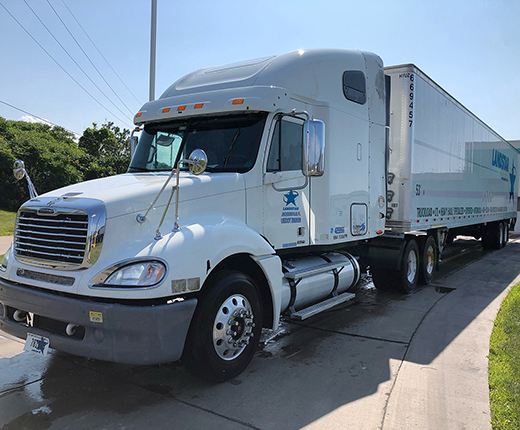
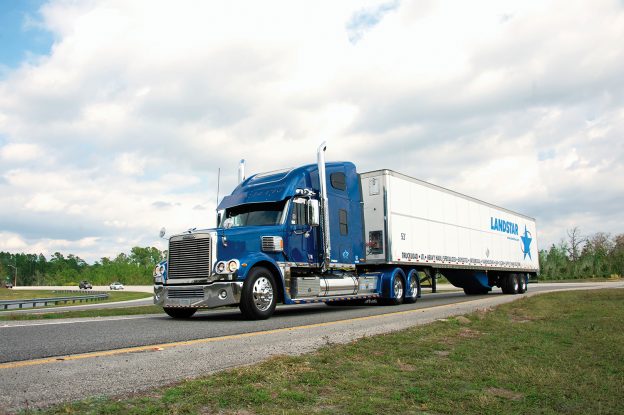

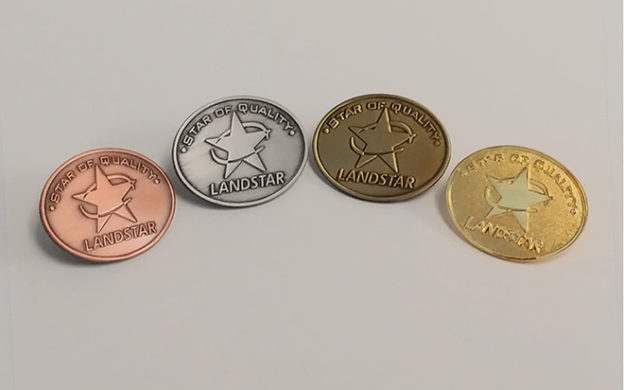
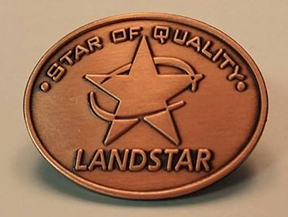
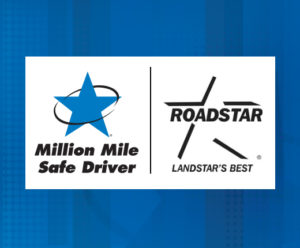 Landstar System, Inc. is pleased to announce its Class of 2019 Million Mile Safe Drivers and
Landstar System, Inc. is pleased to announce its Class of 2019 Million Mile Safe Drivers and

 The Landstar Star of Quality is awarded to Landstar agents, business capacity owners (BCOs) and operators who regularly go above and beyond the call of duty. Their constant dedication to safety and service is recognized with a bronze, silver, gold or platinum Star of Quality lapel pin.
The Landstar Star of Quality is awarded to Landstar agents, business capacity owners (BCOs) and operators who regularly go above and beyond the call of duty. Their constant dedication to safety and service is recognized with a bronze, silver, gold or platinum Star of Quality lapel pin.
You must be logged in to post a comment.